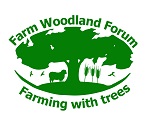Theme
Agroforestry for food, net zero and biodiversity
Dates
Wednesday 19th June 2024 to Thursday 20th June 2024
Location
Cranfield University
Bedfordshire
Programme
Wednesday 19th June
Context and Agroforestry for Food
Agroforestry in the UK: Insights from the EU's LUCAS survey (Arina Machine, University of Leicester)
Tree species selection for sustainable and resilient agroforestry systems (Tom Staton1, Laurence Smith1, Kate Beauchamp2, Alice Broome2, Tom Breeze1; University of Reading1, Forest Research2)
Increasing tree cover at a farm level: understanding farmer preferences and using LCA to assess the environmental impacts (Sally Westaway, Royal Agricultural University)
How does silvoarable alley-cropping with fruit and nut trees affect soil health? (Rosie Scholes1, Simon G Potts1, Paul J Burgess2, Amelia S C Hood1; University of Reading1, Cranfield University2)
Agroforestry for Biodiversity
Determining the effects of agroforestry on multi-taxa biodiversity in Europe (Jari Vandendriessche, Maxime Eeraerts, Pieter De Frenne, Kris Verheyen, Ghent Univrersity, Belgium)
Soil biological quality in temperate agroforestry systems: tree rows enhance soil arthropod abundances, diversity, and QBS-ar scores on UK arable land (Beth Evans, Natural History Museum and University of York)
Higher biodiversity in agroforestry than monoculture fields (Alexa Varah1, Simon Potts2, Jo Smith3, Hannah Jones4; Natural History Museum1, University of Reading2, MVarc3, Farm Carbon Toolkit4)
Agroforestry for Net Zero
Benefits of feeding willow leaves to ruminants may include reduced greenhouse gas emissions (Chris Stoate, Gemma Fox, Jenny Bussell, Game and Wildlife Conservancy Trust, Allerton Project, Loddington)
Trade-offs of integrating trees for food production, profitability and net-zero (Michail L Giannitsopoulos1, Paul J Burgess1, Anil R Graves1, Tommie Ponsioen2; Cranfield University1, Footprinting, EA Wageningen, The Netherlands2)
Greenhouse gas emission reduction using agroforestry solutions in the UK and Ireland (Rodrigo Olave, Jim McAdam, Agri-Food and Biosciences Institute and Irish Agroforestry Forum)
Scaling up, Research Priorities and Policies
Agroforestry in practice. A first hand account of establishing productive nut agroforestry over 200 hectares of farmland in East Anglia, UK. (Archie Ruggles-Brise, Spains Hall Estate)
Co-producing educational and research priorities for UK agroforestry (Amelia (Millie) Hood, University of Reading)
Development of agroforestry at the landscape and county scale in England (Steve Newman1, Stephen Briggs2; BioDiversity International Ltd.1, Abacus Agriculture2)
Policies for agroforestry, a narrative review of four 'continental' regions: EU, India, Brazil and the USA (Rosemary Venn1, Jesse Buratti-Donham2, Fernando-Esteban Montero-de-Oliveira3, Jonathan Eden1, Sabine Reinecke3,4; Coventry University1, Agroecology Europe2, University of Freiburg3, FiBL4)
Posters
Life cycle assessment of alternative tree systems (Elsa Webb, Paul Burgess, Georgios Pexas; Cranfield University)
A data-driven agent-based modelling approach to agricultural transition in England (Ali Parsa, Marco van der Wiel, Ulrich Schmutz, Katherina Dehnen-Schmutz, Rosemary Venn; Coventry University)
Investigating the effects of silvoarable agroforestry systems on pollinator communities (Ellen Knight; University of Reading)
Spatial dynamics of soil functioning in a 20-year-old silvohorticulture system (Josiah B Judson1, Pippa J Chapman1, Joseph Holden1, Marcelo V Galdos2; School of Geography, University of Leeds1, Rothamsted Research2)
Above-ground biomass carbon stocks and annual C sequestration rates of four poplar hybrids in a silvoarable system (Jyoti Narsude, University of Leeds)
How do stakeholders perceive agroforestry in Europe? A systematic map (Elizabeth Rainey, Brunel University)
Aiming high for hedgerows (Christian Gossel, Colin Tosh, Will Simonson; Organic Research Centre)
Silvopastoral systems for climate change mitigation in Northern Ireland: evaluating carbon sequestration potential and policy scenarios (Salim Edris1, A Gabourel2, Rodrigo Olave1, J F Lavado Contador2, S Schnabel2; Agri-Food and Biosciences Institute, Belfast1, University of Extramadura, Spain2)
No Loss Gain in Farm Productivity (Fred Farrelly, Farm Innovation Northern Ireland)
Field Visits
Thursday 20th June
Medbury Farm, Elstow, Bedfordshire. Increasing tree cover on a commercial farm. The managers of Medbury Farm took part in a greenhouse gas calculation project to determine how close the farm is to 'net zero', and have established a range of systems to increase tree cover.
RSPB Hope Farm, Knapwell, Cambridgeshire. Hope Farm is a commercial arable farm managed by the Royal Society for the Protection of Birds. Over recent years, biodiversity has been enhanced and a 11 ha silvoarable system including apples, cobnuts and windbreaks has been established.
| Attachment | Size |
|---|---|
| 1.18 MB | |
| 124.77 KB |
